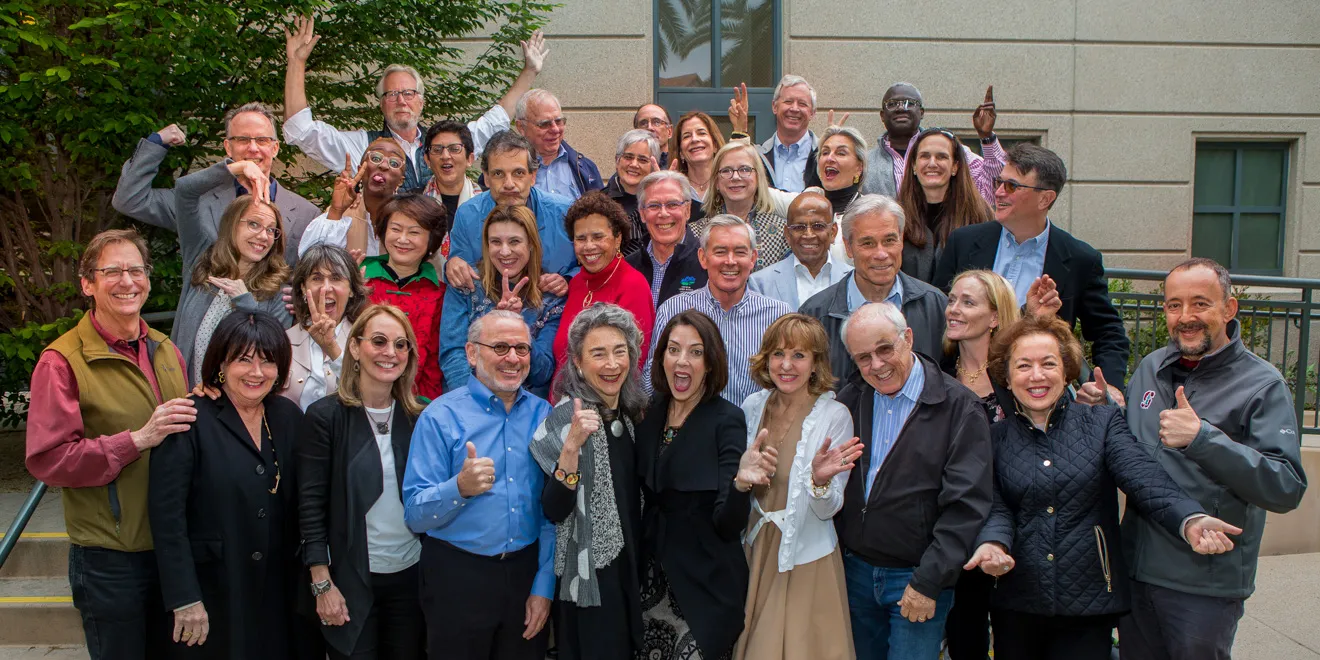Each year, Stanford’s Distinguished Careers Institute (DCI) gives around 25 professionals “with major career accomplishments” an opportunity to return to the undergraduate classroom after several decades in the workforce. DCI fellows spend a year alongside undergraduates, living near campus, attending lectures, completing assigned readings and choosing their next career moves.
Although DCI fellows attend lectures alongside younger students, they do not usually write papers, take exams or attend section meetings, and they do not receive grades for their coursework.
DCI founder and former Stanford School of Medicine Dean Philip Pizzo was ready for a career transition of his own when he stepped down from the dean position he held from 2001 to 2012.
Pizzo created DCI to allow eager participants from around the globe to explore their interests, expand their networks and prepare for a healthy and fulfilling next stage in life. DCI is now in its fifth year, and only about 10 percent of applicants are admitted.
“When I was going to college, I had to work full-time and really was focused on taking what I had to take in order to get my degree as quickly as possible,” said current DCI fellow Melissa Dyrdahl, who studied business as an undergrad at San Jose State University and went on to serve as Chief Marketing Officer at Adobe, among other positions. As a DCI fellow, she said she can finally pursue her interests in music, acting, history, poetry and more.
2018 DCI fellow Mark Clapper, an orthopedic surgeon who is now studying the work of Nobel-Prize winning author John Steinbeck, agreed with Dyrdahl’s sentiment.
“There aren’t a lot of literature courses in medical school,” Clapper said.
DCI fellows are not confined to a major like traditional undergraduates, so they can choose whether to focus on one field of study or take a wide variety of classes from both undergraduate and graduate programs. Clapper, for instance, continues to apply his medical knowledge to healthcare policy classes, biodesign and physiology projects, whereas Dyrdahl is especially interested in the Stanford Center on Longevity.
Neither Dyrdahl nor Clapper has decided what they will do after their fellowship ends, but DCI has sparked new interests among them. These new interests could open the door to a new career, the fellows say. For the moment, though, they are relishing their time in the classroom.
Religious Studies Department Chair and Chinese Buddhism professor John Kieschnick counted several DCI fellows among his recent students. Kieschnick said his experience with the fellows has been “overwhelmingly positive.” He appreciates the perspective they add in discussion-based courses, calling it “a kind of diversity, age diversity, that’s really interesting and useful.”
When students split into small groups for discussion, Kieschnick encourages the DCI fellows to disperse themselves so that everyone gets to talk to students of varied ages. Kieschnick, like Pizzo, said he considers intergenerational discussion an important skill that students will need for the world outside Stanford.
Still, Dyrdahl was initially a little nervous about how undergrads would react to her age.
“It’s like you’re sitting there next to someone who looks like your mom,” she said.
Nevertheless, she said it has ultimately been a positive experience interacting with young people. When younger students ask her for career advice, she’s happy to provide it.
“If there is a drawback,” Kieschnick said, “[it’s that] there’s a potential for the DCI fellows to be less engaged in the class than the undergraduates because there’s less at stake for them.”
Still, he emphasized that fellows have largely added value to his classes.
Similarly to first-year Stanford students, DCI fellows gain not only new knowledge but also new friends through the program. Clapper decided to organize a lecture series for his DCI cohort to keep their social network active.
“The first day you’re like, ‘Who are these people?’ and a month later, ‘These are all my best friends,’” Dyrdahl said.
Pizzo hoped such friendships would emerge when he designed the program. As a doctor, he said DCI works to foster interpersonal relationships, intellectual engagement, a sense of purpose and physical fitness among fellows, as all of these elements factor into long-term health and well-being.
The University of Texas at Austin has formed a program modeled on Stanford’s DCI. According to Pizzo, similar programs are set to emerge at a wide variety of universities and other institutions as well.
Clapper hopes these will include community colleges and other centers accessible to adults without advanced degrees.
As lifespans and retirement ages continue to increase, Pizzo said, an increased number of people will seek fulfilling second acts, with DCI providing an avenue in this pursuit.
Contact Jasmine Kerber at jkerber ‘at’ stanford.edu.
